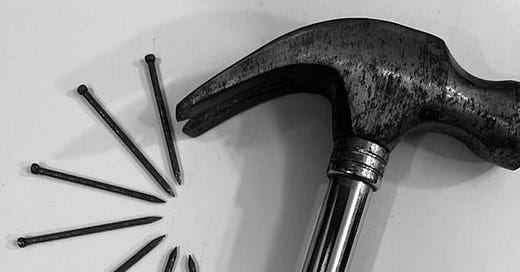Winning English - Mastering Idioms, Slang, and References
Actions Speak Louder Than Words • American Football Idioms • Let's Call It a Day
Hello, Winning English readers! A short note - In today’s post you’ll find two extra examples, for a total of five. This is what you will receive when you become a paid subscriber to the newsletter and podcast. Here in the beginning, Winning English has been freely available, but soon it will only be available through subscription. (Although there will still be occasional, shorter public posts.) Thank you so much for signing up. We couldn’t do it without you!
Okay, I couldn’t resist giving a sixth, extra example. “We couldn’t do it without you” is a common way for groups to express how much they value their customers or supporters.
We’ve all had the experience of listening to a company or an individual tell us about big plans they have for the future. You might be skeptical, though. You might want to see them actually make what they are describing. You might think to yourself, “Actions speak louder than words.”

Photo by Jeffrey F Lin on Unsplash
Actions, of course, don’t “speak”, as in using your voice. Instead, actions “show” what you are willing to do or are capable of doing. In that sense, actions prove your commitment and abilities, while words might just be promises. So, in the end, actions end up being stronger - that is, “louder” - than words.
If you do make a number of promises and then act and succeed, someone might say, “You nailed it!”

Photo by DevVrat Jadon on Unsplash
“To nail it” comes from construction. The idea is that you have perfectly and precisely hammered a nail into a piece of wood. So, “to nail it” is to perfectly accomplish a goal - for example, if you get a perfect score on an exam. It can also mean to be perfectly correct with an answer or statement. For example, in a business meeting, a colleague might say “you nailed it” if you explain a problem well. There is one variation on this, too. Someone might say, “You hit the nail on the head.” The head of a nail is the flat part on top that you hit with a hammer.
I live in the United States, and many Americans are excited that the American football season is underway. American football is incredibly popular here - so much so that many words and phrases from football are used in everyday language.
You might find yourself in a difficult situation - so difficult that only a big, very risky action will save you. So you decide to throw a Hail Mary. If it fails, well, you might just have to punt.

Photo by Keith Johnston on Unsplash
In American football, the team on offense can throw the ball down the field. This is called a pass. Shorter passes are less risky than longer passes. When the team makes a very, very long pass, it’s called “a Hail Mary pass”. That’s often shortened to “a Hail Mary”. “Hail Mary” refers to a prayer from Christianity, praising Mary, the mother of Jesus. The idea is that this pass is so risky, the only way it will succeed is if God helps you.
“To punt” is to kick the ball down the field. Teams only get four attempts (called “downs”) to move the ball 10 yards (about nine meters). If it’s the fourth down and the team hasn’t gone far enough, they’ll often punt the ball down the field to make it harder for the other team. That’s in the game of football. As a saying in everyday English, it has come to mean “to give up” or “to stop trying”, especially if the situation is too risky or not worth your extra effort.
Thanks for reading this extended edition of Winning English! Remember to become a paying subscriber. We rely on you to make this possible. Okay, let’s call it a day!
“Let's call it a day” is an informal way to say let’s finish something, usually a meeting or a workday.


